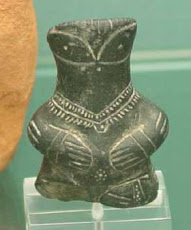"In the thirteenth century, however, a really great scientific man appeared, who may be said to herald the dawn of modern science in Europe. This man was Roger Bacon." -- Oliver J. Lodge, physicist, Pioneers of Science, 1893
"His [Roger Bacon's] own work suffered from the prevailing ignorance...." -- Oliver J. Lodge, physicist, Pioneers of Science, 1893
Bacon, R., The Non-Existence of Magic, ~1265-1278
IV. On Wonderful Artificial Instruments
I will first tell of the wonderful works of art and nature, that I may afterwards assign the causes and manner of them, in which there is nothing magical, that it may be seen that all magic power is inferior to these works, and worthless. And first for the quality and reason of art alone. For instruments of navigation can be made without men as rowers, so that the largest ships, river and ocean, may be borne on, with the guidance of one man, with greater speed than if full of men. Also carriages can be made so that without an animal they may be moved with incalculable speed; as we may assume the scythed chariots to have been, with which battles were fought in ancient times. Also instruments for flying can be made so that a man may sit in the middle of the instrument, revolving some contrivance by which wings artificially constructed may beat the air, in the manner of a bird flying. Also instruments can also be made for walking in the sea or rivers, down to the bottom, without bodily peril. For Alexander the Great used these that he might view the secrets of the ocean, according to what Ethicus the astronomer narrates. These things were done in ancient times, and done in our own, as is certain, unless it may be the instrument for flying, which I have not seen, nor do I know any man who has seen; but I know that the wise man who planned this device completed it. And such things can be made almost infinitely, as bridges across rivers without pillars or any other support, and machines, and unheard of devices.
V. Of Experiments in Artificial Sight
... Glasses can be so constructed that things placed very far off may appear very near, and vice versa; so that from an incredible distance we may read the minutest letters, and number things however little, and make the stars appear where we will. For this it is believed that Julius Caesar, on the shore of the sea in Gaul, discovered through huge glasses the disposition and sites of the castles and towns of Great Britain.










No comments:
Post a Comment